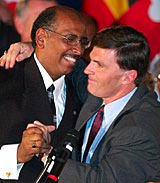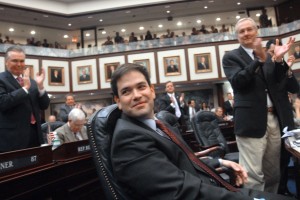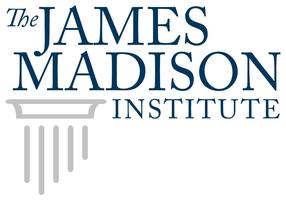 I just came across this in my old files. In late 2009, I had a friend from out of state interview me for a profile he was doing for members of another conservative organization. I never personally published it, but as I just re-read it I thought maybe some of my friends might find my thoughts interesting. It might even be more interesting as this interview was done well before the 2010 and 2012 election cycles, which are really irrelevant to most of the topics I discuss.
I just came across this in my old files. In late 2009, I had a friend from out of state interview me for a profile he was doing for members of another conservative organization. I never personally published it, but as I just re-read it I thought maybe some of my friends might find my thoughts interesting. It might even be more interesting as this interview was done well before the 2010 and 2012 election cycles, which are really irrelevant to most of the topics I discuss.
AN INTERVIEW WITH FRANCISCO GONZALEZ, A FLORIDA CONSERVATIVE (2009)
You more or less read your way into conservatism: what six or eight selections form the essential Canon of Francisco Gonzalez?
This question implies I was a leftist. As far as I can remember, I’ve always been a conservative. But it was not until I was a grad student at the University of Maryland, when I encountered the Intercollegiate Studies Institute (ISI) and the Collegiate Network (CN) that I began to “read my way into conservatism.” Once ISI introduced me to some seminal works, I began to understand why I was a conservative. That said, the more I try to learn about conservatism, the more complex it becomes to me, and thus the harder it is to understand.
The Canon of Francisco Gonzalez includes:
The Roots of American Order by Russell Kirk – by far the best book on the history of Western Civilization and how it relates to the American Founding.
The Road to Serfdom by F.A. Hayek – this book, published in 1943, demonstrates how the growth of government leads to totalitarianism (are we not almost there?)
Memoirs of a Superfluous Man by Albert J. Nock – individualism goes to war with progressivism, as Nock writes an “autobiography of the mind.” Let’s just say this book is a precursor to Michael Jackson’s lyrics, “If you want to make the world a better place, take a look at yourself, and make that change.”
The Conservative Intellectual Movement in America Since 1945 by George Nash – everything you need to know about the “fractious coalition” that has made up the “conservative intellectual” movement in America since WWII.
The Law by Frederic Bastiat – a small, simple book that makes a moral case against socialism. I actually always have 20 copies of this book in the trunk of my car at any given time. I call it my “Bastiat in the Trunk” revolution.
On the Unseriousness of Human Affairs by Father James Schall – what really makes us human? It is not our politics or our economics, but our creative expression in writing, teaching, dancing, playing, singing… this book touches your soul.
American Conservatism: An Encyclopedia – every conservative should own this massive, thoughtful, and enlightening encyclopedia. I like to say “each entry is about the length of a bowl of cereal.”
* The coolest thing about working at ISI is I got to share a meal and drinks with James Schall at Tombs in Georgetown (after sitting in on his government class) and I have gotten to know Annette Kirk, the widow of Russell Kirk, and converse with living legend George Nash. What a privilege.
Tell us about your time at ISI. What is the state of conservatism on America’s college campuses? What are the most heartening and most discouraging trends you observed among young conservatives?
I could really write a book about this question (and indeed, I’ve pondered it). It seems cliché, but ISI really is a lifeline for young conservatives on college campuses, particularly those conservatives that don’t just want to campaign or read talking points for the Republican Party, but really engage an intellectual tradition that is left out of most college textbooks.
I think the state of conservatism on college campuses is brighter than it’s ever been. Sure, leftists still dominate the faculty, but there are more outlets for conservative students (and even for some conservative faculty) than ever before. Meeting and working with hundreds (possibly thousands) of students and faculty across the country really inspired me. I feel like I had this special window into the future of conservatism that almost no one else had. Conservative colleges like Hillsdale and “centers” modeled on Robert George’s program at Princeton are really growing and providing a space for conservative thought to be taken seriously.
Some of the students I encountered simply just get together and read books, debate ideas, and develop their own intellect which they will carry off campus. Others are more activist-oriented: they form Collegiate Network newspapers, blog, protest, campaign, or participate in new media. Others are more service oriented and are trying to truly make a difference through voluntarism.
Plus the kooky, political correct left is dying. Even moderate/liberal students think some of that stuff is silly – John Stewart and South Park point out the ridiculous with humor and college kids buy into it. It’s the fringes that are still loudest, but they will go kicking and screaming to the end.
What’s discouraging? I’m an optimist, so I like to say I’m more encouraged than discouraged. But of course, the “libertine” lifestyles of college students has to be the most troubling. And those lifestyles don’t discriminate by political affiliation. How many of us have seen kids getting blitzed at CPAC? Imagine what they’re doing at their frat houses or in their dorm rooms. If this is the conservatives, we’re in trouble as a society. But that said, I do think there is a silent majority on college campuses living pretty good lifestyles, even a larger number of students attending religious services on (or near) campus. But I do think Tom Wolfe was pretty close to right in his analysis of the “culture” on college campuses in his way too lengthy novel, I Am Charlotte Simmons.
You worked on Bob Ehrlich’s successful campaign for governor of Maryland in 2002. How should conservatives campaign to win and govern to succeed in left-leaning states?
Well I can only say I worked as a college student volunteer in this campaign. As a pro-lifer I campaigned very fervently for a pro-choice Republican like Bob Ehrlich. That said, I never saw him as pro-abortion. He was the first Republican governor in Maryland in 36 years. He won that election against a Kennedy in a state where two out of three voters were registered Democrat. His main platform was fiscal conservatism. He promised to cut the budget and eliminate the billions of dollars of deficit without raising taxes. He did that and was a pretty popular governor who got caught up in the 2006 backlash against the Bush-led GOP. As far as I know, as Governor he never did anything to further the pro-abortion agenda and his Lt. Governor, Michael Steele, participated in a pro-life candlelight vigil. I think Steele being an African-American and pro-life certainly helped Ehrlich win in 2002. 
In states that are so dominated by left-wing politics, like Maryland, New York, and California, conservatives need not compromise their principles, but prudently pick the most conservative candidate that can win. I believe the limited government philosophy is a prerequisite to any conservative candidacy. Anyone that wants to grow government bigger than it is today is not someone a conservative should support, in any circumstance. However, what distinguishes a conservative is that we believe that politics is the art of the possible – we don’t believe in a homogenous utopia. So, a conservative in New York may be different from a conservative in Alabama, but still generally have the same general philosophy towards government.
Florida’s electoral votes have been critical in recent presidential campaigns. Do you have in insight into how Floridians might vote in 2012? What’s your take on Marco Rubio?
Florida is as conservative as it has ever been. Obama simply won here due to the economy, his false promises, the African-American turnout, and John McCain being such a lousy candidate and having such a lousy response to the economy. At the state level, Republicans dominate the executive and legislative branches. And they are (mostly) conservative Republicans. That said, because our Governor, Charlie Crist, (not a conservative) decided he wanted to run for the U.S. Senate instead of a second term as Governor in 2010, every major statewide office is now open. The rush for politicians to “move up” has been unreal. The Republican Attorney General is running for Governor against the CFO, a fiscal conservative Democrat. The Lt. Governor is running for Attorney General. And the list goes on all the way down to state representatives.
One man who was term-limited in 2008, Marco Rubio, is running for U.S. Senate. Yes, he is the REAL DEAL. I’ve interacted with him several times and everyone in Tallahassee (like him or not) knows he’s a true conservative. He’s also articulate and passionate, young (38 years old) and a Cuban-American that was born on U.S. soil. As Speaker of the House, he worked with my organization, The James Madison Institute, probably as closely as a legislator can. My second month on the job, JMI held a free-market health care forum in Tallahassee, at the request of Speaker Rubio. We brought speakers from CATO, AEI, The Manhattan Institute, and more, to interact with the more than 70 members of the 120-member Florida House, who attended our forum, thanks to Speaker Rubio. I believe this race between Rubio and Crist represents the future of the Republican Party – will we go with the squishy moderate or the passionate conservative? I also believe Florida, as a state, is often a bellwether for the nation, with our diverse economies, demographics, and media markets. It’s a fertile place to rebuild the future of conservatism and the future of America.
Tell us about your work at the James Madison Institute. What kind of impact are conservative think tanks like JMI making on state-level policy? How well coordinated are similar organizations in other states?
First, I think using the word “conservative” to describe JMI and other state-based think tanks like ours isn’t completely accurate. We like to simply use the term “free-market” as we don’t touch social issues (or foreign policy). Think of us as where CATO and Heritage mostly agree. We are also a member organization of the State Policy Network. There is now a state-based free-market think tank in every state in the Union. The advantage of these think tanks is that they mostly all focus on economic-based issues so we bring together conservatives and libertarians to limit government and provide free-market solutions for state-based issues. It also gets back to our founders’ idea of federalism and making the states “laboratories” for the nation. We share our ideas, strategies, and best practices with our allies in other states. JMI is currently focused on issues such as school choice, tax reform, property insurance reform, health care, transparency in government spending, philanthropic freedom, energy/environmental issues, and promoting civics education.
What’s the next big thing?
A few years ago, we could have never imagined our nation electing a man with the name Barack Hussein Obama who had almost no experience in anything other than “community organizing” and running for the next best office. A year ago, we could have never imagined the “tea party” movement. It’s hard to predict what’s next.
That said, I think we’ve yet to see the real implications of all the social networking and new media. Communication is up to lightning speed and how we get our news and information is changing rapidly. I think conservatives are already taking advantage of this (Fox News, Twitter, etc) and opportunities exist for us to go around the mainstream media and get our message out to every day Americans.



